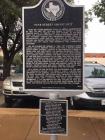Inscription
When the young railroad town of Abilene incorporated in 1883, the first city officials desired to project a more civilized image to visitors and new settlers, as the new town had already developed a lawless reputation since its 1881 founding. Strong laws prohibiting several forms of disorderliness were enacted, especially in places where alcohol was served. Ordinances made it illegal to fire a gun within the city limits, and gambling was completely outlawed.
On the evening of January 8, 1884, City Alderman Frank Collins and his brother, Walter, who was a Taylor County deputy sheriff, entered a saloon at the northeast corner of North First and Pine streets. The saloon proprietor, Zeno L. Hemphill, confronted Frank Collins about the newly-passed anti-gambling laws. (Hemphill had been convicted of assault in 1880 and was scheduled for an April 1884 trial for killing a man the previous year.) Angry words, and then punches, were exchanged, and Hemphill drew a gun and shot Walter Collins, who had stepped between the two men. Gunfire then broke out between Frank Collins and Hemphill. When the dust settled, Walter Collins and Zeno Hemphill were dead, and Frank Collins died from his injuries after two months.
As a result of the incident, the enforcement of the new city ordinances became a top priority. John J. Clinton was appointed as City Marshal, and he served in the position for 37 years. In addition, the episode likely influenced voting in the June 1887 state prohibition election, in which Abilene citizens voted "dry," although the state voted against prohibition. A city prohibition law was defeated in 1894, but in 1902, citizens voted to ban alcohol sales within the city limits, and Abilene saloons remained shuttered for 75 years.
On the evening of January 8, 1884, City Alderman Frank Collins and his brother, Walter, who was a Taylor County deputy sheriff, entered a saloon at the northeast corner of North First and Pine streets. The saloon proprietor, Zeno L. Hemphill, confronted Frank Collins about the newly-passed anti-gambling laws. (Hemphill had been convicted of assault in 1880 and was scheduled for an April 1884 trial for killing a man the previous year.) Angry words, and then punches, were exchanged, and Hemphill drew a gun and shot Walter Collins, who had stepped between the two men. Gunfire then broke out between Frank Collins and Hemphill. When the dust settled, Walter Collins and Zeno Hemphill were dead, and Frank Collins died from his injuries after two months.
As a result of the incident, the enforcement of the new city ordinances became a top priority. John J. Clinton was appointed as City Marshal, and he served in the position for 37 years. In addition, the episode likely influenced voting in the June 1887 state prohibition election, in which Abilene citizens voted "dry," although the state voted against prohibition. A city prohibition law was defeated in 1894, but in 1902, citizens voted to ban alcohol sales within the city limits, and Abilene saloons remained shuttered for 75 years.
Details
| HM Number | HM1M0Q |
|---|---|
| Tags | |
| Marker Number | 16528 |
| Year Placed | 2012 |
| Placed By | Texas Historical Commission |
| Marker Condition | No reports yet |
| Date Added | Monday, July 20th, 2015 at 10:01am PDT -07:00 |
Pictures
Locationbig map
| UTM (WGS84 Datum) | 14S E 431117 N 3590497 |
|---|---|
| Decimal Degrees | 32.44950000, -99.73285000 |
| Degrees and Decimal Minutes | N 32° 26.97', W 99° 43.971' |
| Degrees, Minutes and Seconds | 32° 26' 58.2" N, 99° 43' 58.26" W |
| Driving Directions | Google Maps |
| Area Code(s) | 325 |
| Which side of the road? | Marker is on the right when traveling West |
| Closest Postal Address | At or near 1000-1004 N 1st St, Abilene TX 79601, US |
| Alternative Maps | Google Maps, MapQuest, Bing Maps, Yahoo Maps, MSR Maps, OpenCycleMap, MyTopo Maps, OpenStreetMap |
Is this marker missing? Are the coordinates wrong? Do you have additional information that you would like to share with us? If so, check in.
Nearby Markersshow on map
Maintenance Issues
- Is this marker part of a series?
- What historical period does the marker represent?
- What historical place does the marker represent?
- What type of marker is it?
- What class is the marker?
- What style is the marker?
- This marker could use another picture or two.
- Can this marker be seen from the road?
- Is the marker in the median?

Comments 0 comments